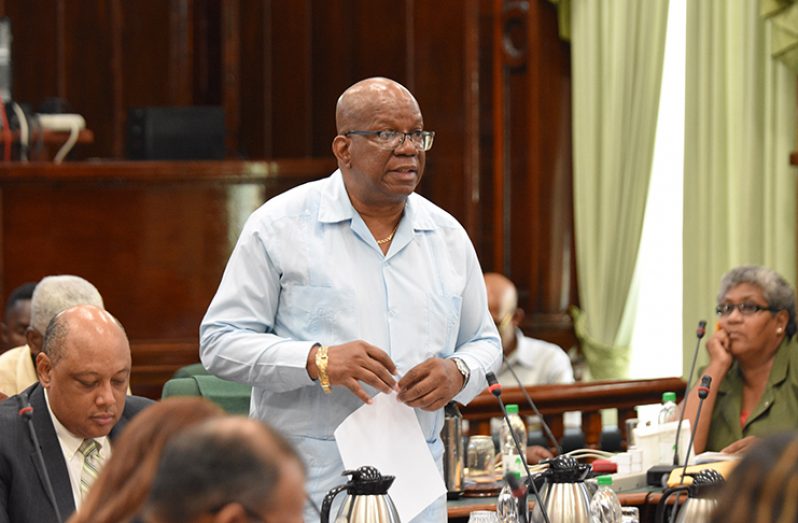…Jordan prefers channelling funds to education, health programmes
FINANCE Minister Winston Jordan on Wednesday embraced the public debate on direct cash transfers to citizens after Guyana begins oil production in March 2020.
Jordan said if such an approach were to be adopted, then extreme caution must be employed, a view shared by Natural Resources Minister Raphael Trotman. He told reporters in the corridors of Parliament, that conditional cash transfers are not new to Guyana. He said over the years, there have been such transfers which targeted education. He pointed to the national school-feeding programmes and the uniform vouchers that students in the public school system receive.
“I must admit to you, I would have a difficulty if Cabinet were to agree to it and in the implementation it wasn’t properly structured,” said the finance minister, who noted that rather than giving citizens US$5000 as hypothetically suggested by economist, Professor Clive Thomas last Sunday in Buxton, issues within critical sectors should be examined.
“Why not look at issues such as education, health, youth programmes, small businesses …teaching a man to fish and then he could do it for a lifetime, rather than giving him a fish when he could only feed himself for a short while,” Jordan suggested, while noting that the matter has not yet reached the level of Cabinet.
He acknowledged that such a system exists farther afield, but requires a robust monitoring system which would call for the establishment of a unit to deal specifically with it. “I would rather hear more debate talking about using our resources to create opportunities for people, so that they themselves can have lasting incomes. Because money that you are giving out will soon end and you would have pitched your lifestyle to the level of the money you receiving and when you can no longer give those monies then what is going to happen?”

Jordan reminded that issues such as classroom sizes and comfort, as well as proper salaries for teachers need to be addressed; and those he believes could be addressed through conditional cash transfers of some sort. “Those are the transfer things which directly would affect the people you would want it to affect. You are not sure when you just give somebody US$5000 what they are going to do with the money.” Moreover, he noted that the term ‘household’ as used by Professor Thomas is “ill-defined.”
“Is every house a household? And what about household sizes?” he asked rhetorically, while noting that he is happy to contribute to the discourse on the subject.
Meanwhile, the finance minister also expressed concern about the rise in expectations among the citizenry, something that his administration has started to manage. “You start a debate like this that started with giving people money rather than looking at Guyana as a country, its problems and how this money can be used to solve those problems,” he said, noting that expectations must be tempered.
He said too that focus is needed to diversify the economy with greater emphasis on the country’s agriculture sector and adding value to it, as well as connecting the coast to the hinterland. “I am really glad the debate has started,” he added.
Don’t reject it
For his part , Trotman said the proposition by Professor Thomas is a legitimate one that should not be ruled out. “It is possible and I don’t think we should reject it outright. It is possible if it is structured. You want to ensure that people who receive transfers serve their country and so we may look at it by added value in the pensions, we want to ensure our young people have educational grants, we want to ensure that the people who receive transfers are registered in our tax system and have paid taxes and are not just turning up and saying I am here to collect,” he said, while rejecting the statements attributed to People’s Progressive Party (PPP) member Anil Nandlall, which suggest that poor people will become “parasites” should they receive the transfers.
“I’d like to say I was aghast to see the description Nandlall attributed to poor people in Guyana– that is a low for Mr Nandlall,” Trotman added. He reminded that in many countries the world over, direct cash transfers have been used as a tool for economic empowerment. Like Jordan, Trotman said Guyana too has benefited from same. “Cash transfers are a known and proven way of alleviating poverty and I was quite taken by Professor Thomas’ introduction of it for discussion. No one is saying it shall be or shall not be… But to say the poor would be parasites is most disappointing.”
The Minister of Natural Resources said too that the public discourse on the subject is timely, as Guyana has within its reserves more than 4B barrels of oil equivalent. “For 50 years Guyanese have been told about their potential and what they are entitled to, we have seen that potential around us. This and future governments have a duty to spread oil wealth in a responsible way to as many Guyanese as possible. The AFC supports any initiative that spreads the wealth transparently and equally not just for some, but to ensure that every citizen in all 10 regions get an equal say in how this money is spent and they get a share of it,” Trotman said, noting that he would make such a representation to cabinet.





.jpg)








